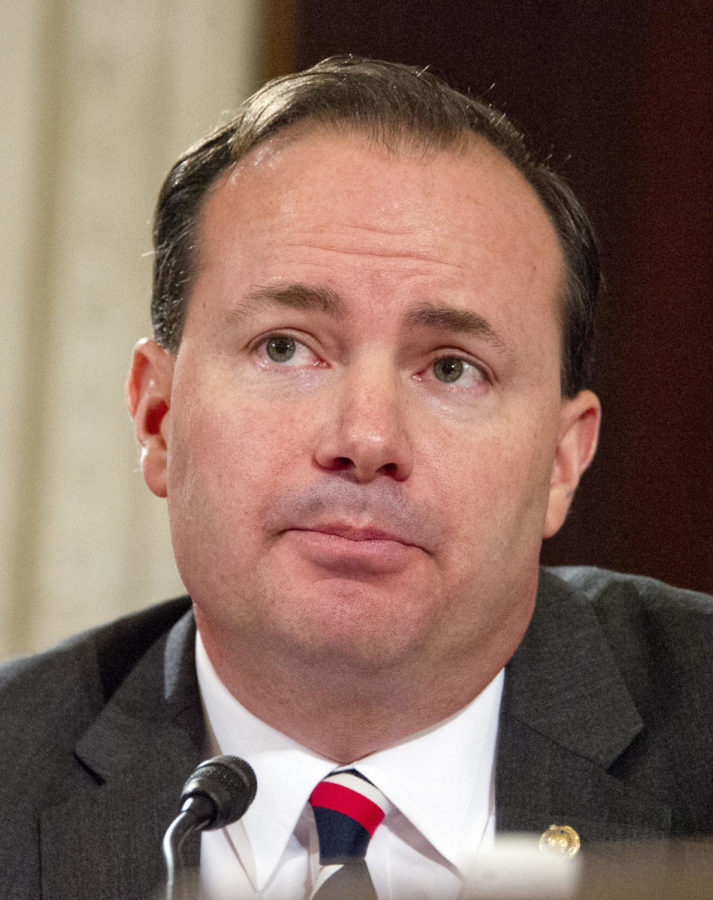Analysis: Primary challengers aren’t always more partisan in Congress
U.S. Senator Mike Lee (R-Utah) at the U.S. Senate Judiciary Committee confirmation hearing on the nomination of Jeff Sessions to be attorney general on Tuesday, Jan. 10, 2017 on Capitol Hill in Washington, D.C. (Ron Sachs/CNP/Sipa USA/TNS)
September 19, 2018
It’s often said that conservative challenges to Republican incumbents in primary elections — the prime example being Dave Brat’s victory over House Majority Leader Eric Cantor in 2014 — have led to more polarization in Congress, with the challengers less willing to compromise than their predecessors.
Now that two incumbent Democrats, Michael E. Capuano of Massachusetts on Sept. 4 and Joseph Crowley of New York in June, have fallen to upstart challengers, it raises the question whether the phenomenon has now spread to the Democratic Party, foreboding even more dysfunction at the Capitol.
There’s some reason to worry about that, but perhaps not as much as many believe.
The challengers who have defeated incumbents in primaries, starting with the tea party election of 2010 through the 2016 campaign, are for the most part more partisan than their predecessors. But the sample size is small and, in some cases, the new representative or senator has been more willing to work with those on the other side of the aisle. From 2010 to 2016, only 15 incumbents — 14 in the House and one senator — lost re-election bids in primaries or at party conventions to challengers who eventually won the seat, excluding those primaries in which two incumbents faced off because of redistricting.
Of those 15, nine of the victors have voted in a more partisan fashion than the incumbent they beat, according to an analysis of party unity voting, while two of the new members were less partisan and four had identical scores. The party unity score evaluates how often representatives and senators vote with their own party when a majority of Democrats split from a majority of Republicans.
But looking at it in a different way yields a different result. The Lugar Center and Georgetown University’s McCourt School of Public Policy rank members of Congress for bipartisanship by looking at how often they introduce or co-sponsor bipartisan legislation.
Their data only goes back a few years, making it impossible to compare the scores of some of the defeated incumbents with the challengers who beat them. But in the six instances where it’s possible to compare the most recent score of the challenger to the final score of the incumbent they defeated, the challenger has posted a higher bipartisan score in five cases, while only one of the challengers has proved more partisan.
Overall, the Lugar Center and Georgetown found that the new members are more partisan than their peers. The 14 representatives averaged a bipartisan rank of 253 in 2017 out of the 435 members _ in the lower half of the House — while the one senator, Republican Mike Lee of Utah, ranked 55th in that chamber.
But that isn’t dispositive because most of the primary races pitted liberals against liberals and conservatives against conservatives. Only one of the incumbents to lose was a moderate: Democratic Rep. Tim Holden of Pennsylvania, who lost to Matt Cartwright in 2012 after redistricting left Holden with a more liberal constituency.
And three of the primary challenges — all pitting upstart Democrats against House incumbents _ had less to do with ideological differences than with ethics: Al Lawson’s 2016 victory over Corinne Brown in Florida, Dwight Evans’ over Chaka Fattah in Pennsylvania that same year, and Seth Moulton’s over John F. Tierney in Massachusetts in 2014.
Some challenges perceived as ideological, such as Lee’s to GOP Sen. Robert F. Bennett in Utah in 2010, have had a mixed effect on bipartisanship in Congress. Lee votes with his fellow Republicans more often than Bennett did, but he’s also been more willing than Bennett to cross the aisle on specific policy issues. Lee joined Democrats in overhauling government domestic surveillance authorities in 2015 and has co-sponsored bipartisan legislation to reduce mandatory minimum prison sentences and to revamp the patent litigation system.
Meanwhile, in one case, an ideologue was defeated by a challenger who promised to be more flexible in order to better serve the district. That was Roger Marshall’s 2016 win in Kansas over GOP Rep. Tim Huelskamp, whose uncompromising conservatism had prompted Speaker John A. Boehner to kick him off the Agriculture Committee.








